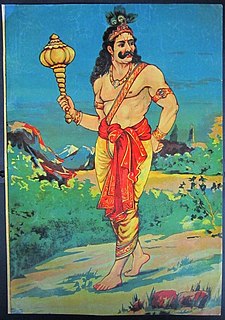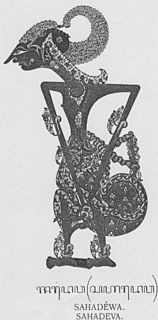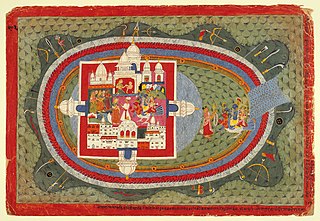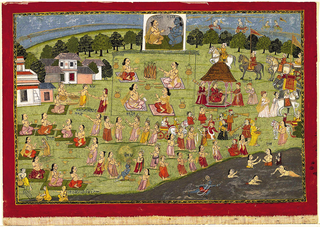
In Hindu mythology, Bhima is the second born of the Pandavas. The Mahabharata relates many events which portray the might of Bhima. Bhima is responsible for slaying all hundred Kaurava brothers in the Kurukshetra War. He was considered to have the physical might of 10,000 elephants.

In the Hindu epic Mahabharata, Sahadeva was the youngest of the five Pandava brothers. Nakula and Sahadev were twins born to Madri, who had invoked the Ashwini Kumaras using Kunti’s boon.Sahadeva had two wives Draupadi and Vijaya. Draupadi was common wife of Pandavas. Vijaya was beloved wife of Sahadeva.

In the epic Mahābhārata, Jayadratha was the king of Sindhu Kingdom. He was married to Dushala, the only sister of the 105 Kaurava brothers. Besides Dussala, he had another two wives, one from Gandhara and the other from Kamboja. He was the son of the king Vridhakshatra. He was killed by Arjuna with the help of Krishna.

Kosala Proper or Uttara Kosala is the kingdom of the celebrated personality of Treta Yuga, Raghava Rama. Ayodhya was its capital, presently in Ayodhya district, Uttar Pradesh. Rama's sons Lava and Kusha inherited parts of this kingdom. Lava ruled from the city called Faizabad and Kusa from the city called Kushavati. A colony of Kosala kings existed in Madhya Pradesh. It was called Dakshina Kosala. Rama's mother Kausalya was from this kingdom. King Rama extended his influence up to the island-kingdom of Lanka situated in the southern ocean. He had friendly relations with the southern kingdom of forest dwellers (Vanaras) called Kishkindha.
Saurashtra kingdom in the epic Mahabharata is one among the many kingdoms ruled by Yadava kings in the central and western India. Other kingdoms in this group include Chedi Kingdom, Dasarna Kingdom, Surasena Kingdom or Vraja Kingdom, Karusha Kingdom, Kunti Kingdom, Avanti Kingdom, Malava Kingdom, Gurjara Kingdom, Anarta Kingdom, Dwaraka Kingdom, Heheya Kingdom and Vidarbha Kingdom.
The historical Avanti Kingdom of ancient India is described in the Mahabharata epic. Avanti was divided into north and south by river Vetravati. Initially, Mahissati was the capital of Southern Avanti, and Ujjaini was of northern Avanti, but at the times of Mahavira and Buddha, Ujjaini was the capital of integrated Avanti. The country of Avanti roughly corresponded to modern Malwa, Nimar and adjoining parts of the Madhya Pradesh.
Anarta is the name of a Vedic period kingdom of ancient India described in the Mahabharata, roughly forming the northern Gujarat state of India. It was founded by a grandson of Vaivasvata, inter alia the father of the present Manu and of Yama, named Anartha. He built a fortress at Kusasthali (Dvaraka), which was later flooded by Varuna. The place remained then for some time as a forest land, before Krishna and the Yadavas went there and built Dvaraka. It was then ruled by Yadavas after they fled from Mathura of Surasena Kingdom, due to the attacks of Jarasandha, the king of Magadha. The Yadava chiefs like Vasudeva Krishna, Bala Rama, Kritavarma and Satyaki, ruled this kingdom under their king Ugrasena. In Mahabharata, Dwaraka is considered as a capital city of Anarta Kingdom. But some other ancient texts like Mahabhagavata, mentions Dwaraka and Anarta as two independent kingdoms. As per the Purana viz. Bhagavata Purana, Bala Rama's wife Revati was from this kingdom.
Madra Kingdom was a kingdom grouped among the western kingdoms in the epic Mahabharata. Its capital was Sagala, modern Sialkot. The Kuru king Pandu's (Pāṇḍu) second wife was from Madra kingdom and was called Madri. The Pandava twins, Nakula and Sahadeva, were her sons. Madri's brother Shalya was the king of Madra. Though affectionate to the Pandavas, he was tricked to give support to Duryodhana and fought against the Pandavas during the Kurukshetra War. He was killed by Yudhishthira, the eldest Pandava. Other than the Madra kingdom with Sagala as its capital, it is believed that there was a Western Madra and a Northern Madra.
Sindhu was a kingdom of ancient India mentioned in the epic Mahabharata and in the Harivamsa Purana. It stretched along the banks of river Sindhu (Indus) in ancient India, in modern Pakistan. It is believed that Sindhu kingdom was founded by Vrsadarbh, one of sons of Sivi. According to the Glimpses of Ancient Sindh, authored by Mirchandani, its capital was known as Vrsadarbhpura, and Tulsianis, later known as Sindhu, was located at or near the location of the present town of Mithankot. The inhabitants of the kingdoms were called Sindhus or Saindhavas. "Sindhu" literally means "sea". According to the epic Mahabharata, Jayadratha was the king of Sindhus, Sauviras and Sivis. Probably Sauvira and Sivi were two kingdoms close to the Sindhu kingdom and Jayadratha conquered them, holding them for some period of time. Sindhu and Sauvira seem to have been two warring states fighting each other.
Kekeya is a kingdom grouped among the western kingdoms in the epic Mahabharata. The epic Ramayana mentions One of the wives of Dasharatha, the king of Kosala and father of Raghava Rama, was from Kekeya kingdom and was known as Kaikeyi. Her son Bharata conquered the neighbouring kingdom of Gandhara and built the city of Takshasila. Later the sons and descendants of Bharata ruled this region from Takshasila.

Gandhāra was a kingdom mentioned in the Indian epics Mahabharata and Ramayana. Gandhara prince Shakuni was the root of all the conspiracies of Duryodhana against the Pandavas, which finally resulted in the Kurukshetra War. Shakuni's sister was the wife of the Kuru king Dhritarashtra and was known as Gandhari. Gandhara was in modern Pakistan. Puskalavati, Takshasila (Taxila) and Purushapura (Peshawar) were cities in this Gandhara kingdom. Takshasila was founded by Raghava Rama's brother Bharata. Bharata's descendants ruled this kingdom afterwards. During epic period it was ruled by Shakuni's father Suvala, Shakuni and Shakuni's son. Arjuna defeated Shakuni's son during his post-war military campaign for Yudhishthira's Aswamedha Yagna.
Kalinga is a tribe described in the legendary Indian text Mahabharata. Its location is the historical Kalinga region in present-day Odisha and northern parts of Andhra Pradesh.
Dravida is mentioned as one of the kingdoms in the southern part of present-day mainland India during the time of the Mahabharata. Sometimes the name Dravida was used to denote all the southern kingdoms collectively and sometimes as a separate kingdom.
Kirata Kingdom (Kirat) in Sanskrit literature and Hindu mythology refers to any kingdom of the Kirata people, who were dwellers mostly in the Himalayas. They took part in the Kurukshetra War along with Parvatas (mountaineers) and other Himalayan tribes. They were widespread in the folds and valleys of Himalayas in Nepal and Bhutan, and also in Indian states of Himachal Pradesh, Uttarakhand, Uttar Pradesh, Bihar, West Bengal, Darjeeling, Sikkim Assam and Tripura including west mountain of Pakistan. Kirata dynasty was established by the king Yalamber

Pragjyotisha was a mythological kingdom that later came to be associated with the historical Kamarupa.

The Bhishma Parva, or the Book of Bhishma, is the sixth of eighteen books of the Indian epic Mahabharata. Bhishma Parva traditionally has 4 sub-books and 122 chapters. The critical edition of Sabha Parva has 4 sub-books and 117 chapters.

The Drona Parva, or the Book of Drona, is the seventh of eighteen books of the Indian epic Mahabharata. Drona Parva traditionally has 8 sub-books and 204 chapters. The critical edition of Drona Parva has 8 sub-books and 173 chapters.

The Karna Parva, or the Book of Karna, is the eighth of eighteen books of the Indian Epic Mahabharata. Karna Parva traditionally has 96 chapters. The critical edition of Karna Parva has 69 chapters















